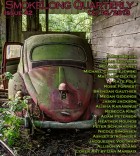What drew me to this story was the concept of a crooked house (There was a crooked man…and they all lived together in a little crooked house) and how the “voice” convinced me that such a house could exist. How did this piece come about? Did the nursery rhyme influence you?
Oh, it’s funny that you phrase the question that way, because this story is very much based on a house I rented back in Arkansas. I was separating from my first husband and in rather a hurry to find a place for me and my son, so I didn’t notice a lot of the weird details before I signed a lease. Things are slightly exaggerated in the story—I believe there were 10-12 outlets in the living room, some as few as a foot from the next one—and only one oddly placed light switch connected to another room, but there were other issues that I couldn’t fit in, like the basement full of broken glass, giant plastic Advil pills, which were promotional items, I suppose, and single shoes without mates. Also, spiders. So many spiders. But it had all the things we needed: plenty of space and windows, lots of room for Hot Wheels cars, and a fenced yard for my dog. As for the nursery rhyme, once I started to figure out all the weird little quirks of that house, that rhyme definitely ran through my head, and I would recite it to my son, who was two then, with words changed around to match us.
Funnily enough, now in Indiana, we live in a slanted house—there is a very distinct lean—and the kitchen counters have been built up as high as four or five inches in places. The fridge will sometimes open on its own, and my husband and I joke that our baby daughter will learn to walk like a sailor if we’re still here when she starts roaming around. Once again, I didn’t notice any of this before moving in. I am the world’s worst house and apartment shopper.
I’ve written about both houses. Just seems like too good an opportunity for metaphor to let it pass. Space influences so much in our lives that if it’s skewed, I’m not sure everything else can be in equilibrium unless you work at it.
So writing about crooked houses is a natural metaphor for you! It’s funny how often we are led to circumstances that inform our work. Can you talk little about the voice of this piece?
This piece actually started as a (rather mediocre) poem, so a lot of that voice really comes from me and my natural modes: I make lists, I contrast, and my natural tendency is to write in a bit of a tumble, a sort of headlong crash. When I attempt poetry, I stick close to my defaults, so when I later turn some of those poems into stories, they’re all there and it’s just a matter of trying to shape that mass into something a little more sensible. But since this story was, at its heart, about not having good sense, I felt like it needed to burst at the seams with emotion. Mostly, I tried to skirt back from melodrama (another unfortunate tendency), but this one is all me. I read an earlier version here at Purdue some time ago, and to me, it just sounded like me talking. Like I was telling a story.
Can you tell us who inspires you?
I love Randall Brown in particular, and Lindsay Hunter (her collections are always close at hand these days), and the people from whom I first learned about flash, when I was a young’un at the Zoetrope Virtual Studio: Kathy Fish, Myfanwy Collins, folks like that. My friends Matthew Burnside and Amy Rossi are my personal flash gurus; I learn so much from them, and Amy is my first, best reader, too (after my husband!). In a broader sense, I love Dan Chaon and Jhumpa Lahiri—they can take anything, absolutely anything, and put a shine on it without going off the rails in terms of language, something I really admire as I often must rein in what I like to think of as my “flair,” but is really my serious overwriting. I read a lot of poetry, too, Cate Marvin, Joanna Klink, and Alice Notley, for instance, and I’m a big fan of the often plainspoken intensity of books like Dorothea Lasky’s Black Life.
What are you working on now?
Right now, I’m writing my thesis for my MFA, and I’m taking a bit of a nontraditional route, as I’m writing not one, but two short-short collections, one based around a fictional Illinois town, and one focused particularly on feminine issues. I didn’t set out for such a thing (because I am not crazy), but it happened naturally, as the stories I’ve been writing have fallen very clearly into two categories that, unfortunately, cannot be linked. That’s the bad news; the good news is I’m very happy with all the work I’ve produced toward these collections so far. I like to stay challenged.
Quick. What advice would you give new writers?
Don’t stop. Just write. Don’t self-censor, don’t question, just write! You’re not carving in stone tablets here. It can all be fixed later, so don’t stop; let your instincts run free. I wish I’d known that years ago.



 The SmokeLong Grand Micro Contest (The Mikey) is now an annual competition celebrating and compensating the best micro fiction and nonfiction online.
The SmokeLong Grand Micro Contest (The Mikey) is now an annual competition celebrating and compensating the best micro fiction and nonfiction online.